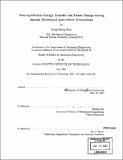Non-equilibrium energy transfer and phase change during intense picosecond laser-metal interactions
Author(s)
Kuo, Long-Sheng, 1969-
DownloadFull printable version (1.928Mb)
Other Contributors
Massachusetts Institute of Technology. Dept. of Mechanical Engineering.
Advisor
Taiqing Qiu.
Terms of use
Metadata
Show full item recordAbstract
Laser interactions with metals involve absorption of photon energy by electrons, energy coupling between electrons and the lattice, and energy transport by diffusion of electrons and lattice vibrations. During picosecond laser irradiation of metal films, electrons and the lattice are not in thermal equilibrium. On the other hand, rapid laser heating produces a large degree of superheating and undercooling during melting and solidification. First, this work investigates experimentally non-equilibrium heating processes during intense picosecond laser heating of metal films. Results show excellent agreement with predictions of the two-step radiation heating model. Second, this work develops a general model to characterize both non-equilibrium energy deposition and phase change processes. The predictions show that the non-equilibrium heating processes significantly increase the laser melting threshold, enlarge the thermal-affected region, reduce the lattice temperature rise, prolong the phase change duration, and reduce the solidification speed. These results are important for materials processing using ultrashort pulsed lasers.
Description
Thesis (S.M.)--Massachusetts Institute of Technology, Dept. of Mechanical Engineering, 2001. Includes bibliographical references (leaves 55-57).
Date issued
2001Department
Massachusetts Institute of Technology. Department of Mechanical EngineeringPublisher
Massachusetts Institute of Technology
Keywords
Mechanical Engineering.